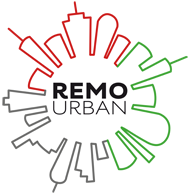REMOURBAN

The project REMOURBAN aims to develop and validate a REgeneration MOdel for accelerating the smart URBAN transformation in three different Lighthouse cities: Valladolid (Spain), Nottingham (UK), and Tepebaşı/Eskişehir (Turkey). The model leverages the synergies among energy, mobility, and ICT sectors to accelerate the deployment of innovative technologies and both organisational and economic solutions. The REMOURBAN is a EU co-funded project.
It contributes to the increment of resource and energy efficiency, the improvement of sustainable urban transport, and the decrease of greenhouse gas emissions in urban areas. The renovation strategy focuses on citizens, making them the foundation of Smart City Development. In order to achieve its objectives, RemoUrban took action on four different dimensions:
ENERGY: addressed to building, retrofitting and changing energy sources in low energy districts, focusing on redirecting energy production towards Renewable Energy Sources.
- Monitoring Tools for Energy: development and deployment of monitoring tools to improve energy efficiency and financial viability, track progress towards these goals, and ensure optimal performance in both areas.
- District Scale Retrofitting: addition of new technologies to old districts in order to improve efficiency, sustainability and users’ comfort.
- Renewable Heating & Cooling: generating heating and cooling with renewable energy sources to reduce Greenhouse gas emissions.
- Electricity Distributed Generation and Advanced BEMS (Building Energy Management System): generating electricity from small-scale energy sources located near users so as to reduce energy dissipation en route.
MOBILITY: improving vehicles, public transport ecosystems and diminishing carbon footprint.
- Improve Clean Power for Transport: enhancing electric and hybrid technologies for vehicles and their supporting infrastructures.
- Foster Seamless Door-To-Door Multi-Modality in Urban Transport: improving mobility services connection and nodes.
- Further Clean Logistics: optimising urban logistics supply chain.
- Open Up Intelligence in Urban Transport Systems: supporting open data to optimise mobility services and their energy consumption.
- Promote the Use of Cleaner Vehicles: cities provide incentive schemes to stimulate sustainable mobility.
ICT: focusing on Smart Grids and city Information Platforms so as to enable urban infrastructure integration, empower people to interact by becoming "sensors," and create business cases for network integration.
- City Information Platform: combining and managing multiple data sources to improve operations and decision-making.
- Shared Infrastructure Planning: exploiting synergies between smart grid and broadband infrastructure.
- Transforming the Energy Chain: dynamically balancing demand and supply between renewable and traditional sources.
- Road Systems: Mobile ITS to optimise traffic flow and reduce emissions.
- Intelligent Multi-Modal Transport Solutions: real-time multi-modal info to improve the user’s travelling experience.
- Peer-To-Peer Transport Information: cloud-based process to support taxi and car sharing.
- Adverse Events: connecting information sources with city infrastructures to increase its resilience against adverse events.
SOCIETY: Empowering citizens for sustainable city renovation by addressing non-technical barriers and promoting smart city markets.
- Tools for Community Insight and Engagement: methods to understand communities and citizens.
- Social Network Regulation: how to embrace ang guide the use of proprietary social networks to improve public well-being.
- Stakeholder Platform: establishing a platform for stakeholders, providing feedback, and organising mentoring for new entities and citizens in order to give feedback on policies.
- City Visualization: implementing visualization techniques to involve citizens in city planning and real-time views.
- Smart City Strategy and Implement Plan: leveraging stakeholder-backed strategic vision, long-term policies, and regulatory frameworks.
- Innovative Funding Models: combining funding instruments and commitments
- Smart Energy Map: developing maps that capture both production and consumption of energy over sectors.
- EU Smart City Indicator Framework: adopting and adapting existing assets, while establishing means for wide-scale adoption through pilot testing.

Mission
REMOURBAN aims to demonstrate a sustainable urban regeneration model in lighthouse cities, which will be replicated by follower cities across Europe. The model aims to integrate energy, mobility, and ICT solutions to achieve significant reductions in energy consumption and greenhouse gas emissions, while improving the quality of life for citizens. Through large-scale demonstrations, REMOURBAN seeks to create a blueprint for sustainable urban development that can be adapted and applied in cities across Europe and beyond. These values support the New European Bauhaus (NEB)’s principles of Sustainability and Inclusivity.
Technical factsheet
- Date: January 2015-June 2020
- Funded Co-funded
- Value €24,754,878.10
- Application category Innovation | Urban Design
- Related Technical Working Group Community and Sustainability